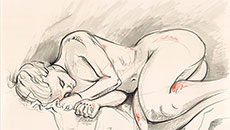Two beneficial variants of a gene controlling red blood cells development have spread from Africa into nearly all human populations across the globe, a study reveals.
While studying patients of African and South Asian descent, researchers at King's College London noticed that two genetic variants controlling the red blood cell regulator gene are of similar genetic structure not only in them but also in individuals of other populations.
These beneficial variants that promote foetal haemoglobin in the body are a general feature of human populations across the world and that they might have a common origin.
Foetal haemoglobin is normally found in foetuses and infants, but some patients with inherited blood disorders who are able to keep making it as adults experience milder symptoms of their condition.
"Patients who have milder versions of blood disorders carry genetic clues that are helping us to understand the function of the genes and biological pathways involved in these diseases," said Stephen Menzel from department of molecular haematology at King's College London.
Sickle cell anaemia and Thalassaemia are inherited blood disorders. Studies have shown that carriers of these conditions are protected against malaria.
The study at King's College London looked at genetic factors that can reduce the severity of these blood disorders.
Patients who have the genetic factors that increase foetal haemoglobin production tend to have milder symptoms of blood disorders.
They found that one genetic variant controlling the red blood cell regulator gene MYB - "MYB enhancer variant" - on chromosome 6 is of similar genetic structure.
The team searched for genetic signatures of such variants in public genome data generated from world populations to see whether they existed in other ethnic groups.
They found signatures for two different types of MYB enhancer variants -- HMIP-2A and HMIP-B -- in major human population groups and in nearly all ethnic groups covered by the data.
Both variants occur in Sub-Saharan Africa, but only at low frequencies.
This combination is relatively common in Europe, South Asia and China.
"'MYB enhancer variants' that modulate the severity of sickle cell and beta thalassaemia have arisen twice in modern humans - in Africa and then spread to the rest of the world," researchers concluded.





